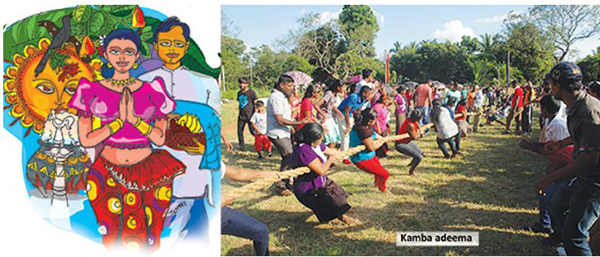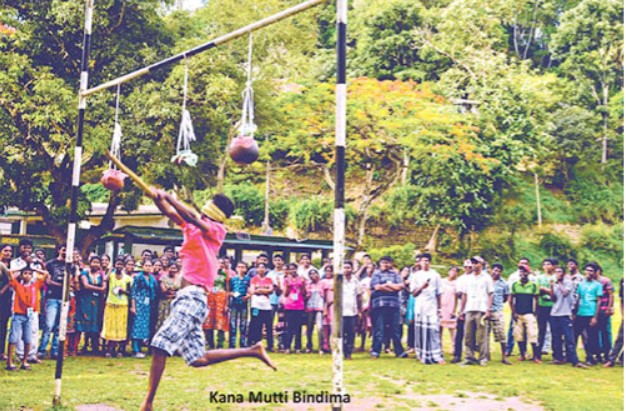
Source:Island
Food, games and rituals make a better part of New Year celebrations. One major perk of Avurudu is the festivals that are organised in each neighbourhood in its celebration. Observing all the rituals, like boiling milk, partaking of the first meal, anointing of oil, setting off to work, are, no doubt exciting, but much looked-forward-to is the local Avurudu Uthsawaya.
Avurudu Krida or New Year games are categorised as indoor and outdoor games. All indoor games are played on the floor and outdoor games played during the Avurudu Uthsava or New Year festival, with the whole neighbourhood taking part. Some of the indoor games are Pancha Dameema, Olinda Keliya and Cadju Dameema. Outdoor games include Kotta pora, Onchili pedeema, Raban geseema, Kana mutti bindeema, Placing the eye on the elephant, Coconut grating competition, Bun-eating competition, Lime-on-spoon race, Kamba adeema (Tug-o-War) and Lissana gaha nageema (climbing the greased pole). And what’s an Avurudhu Uthsava sans an Avurudu Kumari pageant, minus the usual drama that high profile beauty pageants of the day entail, of course.

A salient point of New Year games is that there are no age categories. Although there are games reserved for children such as blowing of balloons, races and soft drinks drinking contests, most other games are not age based.
Kotta pora aka pillow fights are not the kind the average teenagers fight out with their siblings, on plush beds. This is a serious game, wherein players have to balance themselves on a horizontal log in a seated position. With one hand tied behind their back and wielding the pillow with the other, players have to knock the opponent off balance. Whoever knocks the opponent off the log first, wins. The game is usually played over a muddy pit, so the loser goes home with a mud bath.

Climbing the greased pole is fun to watch, but cannot be fun to take part in. A flag is tied to the end of a timber pole-fixed to the ground and greased along the whole length. The objective of the players is to climb the pole, referred to as the ‘tree’, and bring down the flag. Retrieving the flag is never achieved on the first climb. It takes multiple climbers removing some of the grease at a time, so someone could finally retrieve the flag.
Who knew that scraping coconut could be made into an interesting game? During the Avurudu coconut scraping competition, women sit on coconut scraper stools and try to scrape a coconut as fast as possible. The one who finishes first wins. These maybe Avurudu games, but they are taken quite seriously. The grated coconut is inspected for clumps and those with ungrated clumps are disqualified.
Coconut palm weaving is another interesting contest that is exclusive to women. However men are by no means discouraged from entering such contests and, in fact, few men do. Participants are given equally measured coconut fronds and the one who finishes first wins.
 Kana Mutti Bindima involves breaking one of many water filled clay pots hung overhead, using a long wooden beam. Placing the eye on the elephant is another game played while blindfolded. An elephant is drawn on a black or white board and the blindfolded person has to spot the eye of the elephant. Another competition involves feeding the partner yoghurt or curd while blindfolded.
Kana Mutti Bindima involves breaking one of many water filled clay pots hung overhead, using a long wooden beam. Placing the eye on the elephant is another game played while blindfolded. An elephant is drawn on a black or white board and the blindfolded person has to spot the eye of the elephant. Another competition involves feeding the partner yoghurt or curd while blindfolded.
The Banis-eating contest involves eating tea buns tied to a string. Contestants run to the buns with their hands tied behind their backs and have to eat buns hanging from a string, on their knees. The one who finishes his or her bun first, wins. Kamba adeema or Tug-o-War pits two teams against each other in a test of strength. Teams pull on opposite ends of a rope, with the goal being to bring the rope a certain distance in one direction against the force of the opposing team’s pull.
Participants of the lime-on-spoon race have to run a certain distance while balancing a lime on a spoon, with the handle in their mouths. The first person to cross the finish line without dropping the lime wins. The sack race and the three-legged race are equally fun to watch and to take part in. In the sack race, participants get into jute sacks and hop for the finish line. The first one over, wins. In the three-legged race one leg of each pair of participants are tied together and the duo must reach the finish line by synchronising their running, else they would trip over their own feet.

Pancha Dameema is an indoor game played in two groups, using five small shells, a coconut shell and a game board. Olinda is another indoor board game, normally played by two players. The board has nine holes, four beads each. The player who collects the most number of seeds win.
This is the verse sung while playing the game:
“Olinda thibenne koi koi dese,
Olinda thibenne bangali dese…
Genath hadanne koi koi dese,
Genath hadanne Sinhala dese…”






